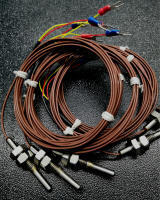Toll Free: (800) 888-8987 | Phone: (440) 835-3540 | office@ramsensors.com
Type J Thermocouple Wire vs. Type K Thermocouple Wire
Light and heavy machinery, as well as industrial equipment, operates effectively when the temperatures are within a certain range as specified by the manufacturer. The quality of output is sometimes directly proportional to the temperature range. For that reason, it is imperative that you have quality thermocouples that give you accurate temperature readings.
When considering what personalized thermocouple to adopt, three important components should be accounted for to ensure that you get a device that gives you accurate temperature gauges that are reliable in the long-term:
- Thermowell: This protective sheath should be resistant and non-reactive to the thermocouple wire so that the cold and hot temperature sensors can perform effectively.
- Temperature gauge: This device measures the temperature of a substance being monitored with either an analogue display or a digital readout.
- Thermocouple wire: The wire used in a thermocouple junction is made from two dissimilar metal conductors that are welded together at the sensing end.
There are different types of thermocouple wires that determine what temperature range can be measured and the accuracy of the readings. These options enable you to customize your thermocouple to suit your needs with the help of qualified experts like RAM Sensors. In this article, we will discuss the pros and cons of type J thermocouple wire and type K thermocouple wire.
Type J Thermocouple Wire
Type J thermocouple wire is ideal for light industries where the temperatures range between -210°C to 1200°C or -346°F to 2193°F. The live positive leg is made of iron while the neutral leg is a copper-nickel alloy (constantan).
However, type J thermocouple wire is not ideal for high temperatures above 750°C (1382°F). This is because when the iron is exposed to oxidizing agents that penetrate the thermowell, the iron undergoes an irreversible molecular change that results in incorrect transmission of voltage in the loop, leading to inaccurate temperature readings. Additionally, MgO insulation on type J thermocouple wire is not tolerant to a higher temperature range.
Pros of Type J Thermocouple Wire
- Affordability
- Versatility
- Ideal for installations where temperatures reduce rapidly
Cons of Type J Thermocouple Wire
- Unreliable at low temperatures
- 0.75% limit of error subject to a maximum of 2.2°C (35.96°F)
Type K Thermocouple Wire
Type K thermocouple wire is ideal for industrial use where the expected temperature oscillates between 270°C to 1372°C or -454°F to 2501°F. The wires are made of chromel and alumel legs, which are resistant to corrosion and therefore ideal for applications where there are oxidizing agents.
The type K thermocouple wire is popular because different calibrations can be customized for different purposes and industries. It is also long-lasting, making the 0.75% limit of error reliable.
Pros of Type K Thermocouple Wire
- Affordability
- Higher temperature range
- Non-corrosive
Cons of Type K Thermocouple Wire
- Not ideal for rapidly reducing temperatures
Other Types of Thermocouple Wire
Types T, B, R, N, E, and are the less common thermocouple wires that you can consider for your apparatus. Some base materials and alloys used in the different thermocouple wire types are suitable for different circumstances, such as extremely low temperature or resistance to oxidation at high temperatures.
Contact RAM Sensors for Expert Advice on Thermocouple Wire
You should consider the standard and special limits of errors for each thermocouple wire and ensure that the margin is not significant enough to alter the quality of your output. Contact us today for expert consultation on thermocouple wire for a wide range of customized temperature sensors.





